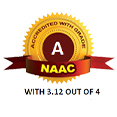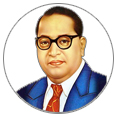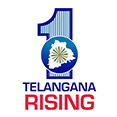1. About the Department
Sociology is a subject which has social relevance in our day to day life. Sociology one of the popular departments in Dr. B. R. Ambedkar Open University offers a complete and holistic study of the discipline of Sociology through Distance mode. The Department of Sociology was established in the year 1983. The Department offers a wide spectrum of specialised and common core courses at Under Graduate and Post Graduate level Programmes. In keeping with the spirit of the ‘Vision & Mission’ of the University, the department has organized its academic programmes to meet the requirements of the diverse sections of the society.
2. Under Graduate level
From its inception in 1983, the University has identified Sociology as one of the basic subjects at Under Graduation level. Interestingly there was only one student who joined in the 1983 batch. The University started offering Sociology in its Bachelor’s programme at 26 study centres initially and presently it is extended to 180 study centres. The BA Programme (BA I, II & III years, CBCS) is offered in Telugu and English mediums. The courses offered in this discipline focus on core subject areas that are expected to provide students with a solid grounding in the study of Sociology.
3. Post Graduation level
The department has introduced Post Graduation Programme (MA Sociology) from the Academic Year 2002-03 onwards in Telugu medium. Initially the programme was offered at 12 study centres and is now spread over to 19 study centres at district level with average state wide enrolment of 600 students in every Academic Year.
The MA programme comprising altogether 10 courses in two years, were structured to understand the theories of social behaviour at macro and micro levels. The MA I year program comprises of 5 courses: Course-01: Principles of Sociology; Course-02: Sociological Theory and Perspectives; Course-03: Research Methods and Social Statistics; Course-04: Rural and Urban Sociology; Course-05: Population Studies. The MA II year courses include: Course-06: Applied Sociology; Course-07: Social Movements and Change in India; Course-08: Social Anthropology and Tribal Studies; Course-09: Industrial Sociology and Labour Welfare; Course-10: Sociology of Health.
4. Research Programmes
M.Phil. / Ph.D. - Research Programmes leading to the award of M.Phil. & Ph.D. was introduced from the year 2008. In the first batch (2008-09), fou6r students were admitted into Ph.D., programme and twelve students into M.Phil programme. In the second batch (2009-10), six students were admitted into Ph.D., programme and eleven students into M.Phil programme. The topics selected for research are varied and of current importance. Some of the broad subject fields on which research is been conducted include -Urban Studies, Medical Sociology, NGO’s, Sociology of Education, Women Studies, Tribal Studies and Ethnographic Studies.
5. Profile of the Faculty members
In Open Learning the role of the teacher is different from conventional Universities. Most of the time teachers engage in planning the programmes, developing the curriculum, course development, editing and maintaining the programmes. Apart from this, teachers in the Open University also develop Audio-Visual materials including evaluation of the students; guide the scholars working in the department.
Prof. Vidyavathi (Retd) was the faculty member of the Department. She achieved several distinctions in her career. She held several academic and administrative positions in the University including the Head, Department of Sociology, and Coordinator for Women Studies, Dean, Faculty of Social Sciences and Chairperson of Departmental Level Research Committee (DLRC), Faculty of Social Sciences. She was honoured with the State Best Teacher award in 2007 by the Govt. of Andhra Pradesh.
Prof. Ghanta Chakrapani, M.A., M.C.J., Ph.D., Osmania University, Hyderabad is Professor of Sociology and Presently, Dean, Faculty of Social Sciences and Director, Centre for Staff Training and Development (CSTD). Prof. Ghanta Chakrapani has the honour of being the appointed the First Chairman of the Telangana State Public Service Commission, (TSPSC) of the Telangana State. Prof. Chakrapani Ghanta is a distinguished fellow at India China Institute, New School, New York (2006-08). His areas of interest include Globalisation, Urban Sociology, Human Rights and Social Empowerment. Widely acclaimed as a distinguished Academician and a journalist, Prof. Ghanta Chakrapani has participated in serious social debates across Telugu newspapers and in research journals over two decades. He is the Executive Editor for ‘The Sociologist’a Research journal published both Telangana and A.P. States and is the Founder President of Telangana Sociological Society (TSI).
Dr. P. Venkata Ramana, M.A., Ph. D. (Kakatiya University, Warangal) is Associate Professor of Sociology, and Presently Controller of Examination. His research interests include Women Studies, Criminology and Tribal Studies. He has authored several books in the discipline of Sociology and has published twenty four articles in various journals. He has participated and presented papers in thirty five International/National Seminars. He is the Life Member of Andhra Pradesh Sociological Society (APSS) and Indian Sociological Society (ISS).
Dr. B. Srinivas, M.A., Ph.D., (Kakatiya University, Warangal) is Associate Professor of Sociology and I/c. Head of the Department & Addl.Controller of Examinations. He was qualified in State Level Eligibility Test in 1998.His research interests include NGOs, Rural Sociology, Tribal Studies, and Women studies. He is the Life Member of Andhra Pradesh Sociological Society (APSS) and Indian Sociological Society (ISS). He has extended his discourse where he has developed content for several academic television and radio documentary programmes. Dr. B. Srinivas has participated and contributed papers in several seminars and conferences on various socio- economic issues.
6. Academicians associated with the Department
Many distinguished Professors from different Universities were associated with the DepartmentalAcademic activities. Among them were Late. Prof Y.B. Abbasayulu, Retired Professor of Osmania University, Hyderabad, Late. Prof. Muralidharudu, Retired Professor, Prof. C. Umamohan, Retired Professor, Prof. Amarnath R. Das, Prof. R. Vijaya Krishna Naidu, Prof. G. Venkata Ramana of Sri Krishnadevaraya University, Anantapur, Prof. K. Ranga Rao, Prof. K. Radhakrishna Murthy, Prof. U. Tataji of Andhra University, Visakhapatnam, Prof. E. Hari Babu, Prof. P. Purendra Prasad, Prof. G. Nagaraju, Prof. C. RAghava Reddy and Dr. C. Naga Lakshmi from University of Hyderabad, Prof. G. Satyanarayana, Prof. P. Kamala Rao, Prof. Sunanda Pande, Prof. R. S. N. Reddy, Prof. Pushpa Mary Rani,Retired Professors and Prof. C. Ganesh from Osmania University, Hyderabad. Prof. MSN Reddy, Prof. M. Hanumantha Rao, Prof. Rathnaiah, Prof. S. Bhaskar, Prof. V. Reddappa Naidu Retired Professors from Sri Venkateswara University, Tirupati. Prof. N. Ramulu, Prof. D.M.Ravi Prasad, Prof. K. Ramanuja Rao Retired Professors, Prof. T. Srinivas, Prof. T. Ramesh and Dr. M. Swarnalath from Kakatiya University, Hyderabad.
7. Alumni Prospects
A large number of students who obtained degrees from the Department of Sociology have been able to secure good jobs in the Government sector and Non-Government sector. In Government sector most of the students are getting employment in Indira Kranti Patham as Mandal/District level managers. The other opportunities are as Welfare Officer or Personal Officer in industries and as Probationary Officer in Jails/Prisons. Social Welfare, Women & Child Welfare departments prefer candidates of Sociology background. A large section of our students are now getting placements in Non-Governmental Organizations, municipalities and other establishments as Community Workers and Social Workers. Most of the students have joined as Counsellors in Integrated Counselling & Testing Centres (ICTC) under AIDS Control Society.
8. Target Group
- School/College Drop-outs
- Working Professionals
- Service Personnel
- Teachers
- Government Employees
- Differently Abled Persons
- Home Makers
- Unemployed Candidates
9. Eligibility
UG: Pass in Intermediate or its equivalent course
PG: Bachelor’s Degree in any discipline
M.Phil/Ph.D: Master’s degree or a professional degree declared equivalent to the Master’s degree with at least 55% marks in aggregate or its equivalent Grade ‘B’ in the UGC 7-Point scale.
10. Mode of Admission –
UG – Direct
PG - Direct
M.Phil/Ph.D –Entrance Examination/UGC NET/TSSET
11. Duration of the Programme
UG – Minimum 3 years – Maximum 9 years
PG – Minimum 2 years – Maximum 6 years
M.Phil – Minimum duration of two (2) semesters/ one year and a maximum of four (4) consecutive semesters /two years
Ph.D – Minimum duration of three years including course work and a maximum of six (6) years
12. Number of Courses
UG – B.A Sociology is divided into 6 Semesters and 12 courses
PG – M.A Sociology has 10 courses
13. Student support Arrangement:
UG and PG: The student is provided with the Self-Learning Material supplemented by the Audio, Video Lessons and Tele-Conference on specified Sundays. The face to face counseling sessions are conducted on Sundays at the study centers.
M.Phil/PhD: Besides the above, one semester classes will be conducted for the research candidates.
14. Course Fee
UG: I year – Rs. 2150/-; II year: Rs. 2000/-; III year – Rs.2000/-
PG: I year – Rs. 4400/-; II year: Rs. 4200/-
M.Phil – Rs. 30,000/- in three installments.
Ph.D – Rs. 45,000/- in three installments.
15. Evaluation
UG – At the end of the semester, the progress of the student is assessed by conducting in person Semester-wise Examinations in their subjects of study.
PG- Annual end examination is conducted at the end of the academic year
M.Phil/Ph.D .
16. Award system
Distinction- 70 % and above
1st Division – 60% and above
2nd Division – 50% and above
The Department awards gold Medals to the students who secure highest aggregate marks in the subject and completes the programme within the specified time earmarked by the University.
|
For Further Details
HEAD, Department of Sociology
Faculty of Social Sciences
Academic Branch
Dr.B.R. Ambedkar Open University
Prof.G.Ram Reddy Marg, Jubilee Hills
HYDERABAD, Telangana State- 500 033
Cantact No: 04023680 479, 485
|



